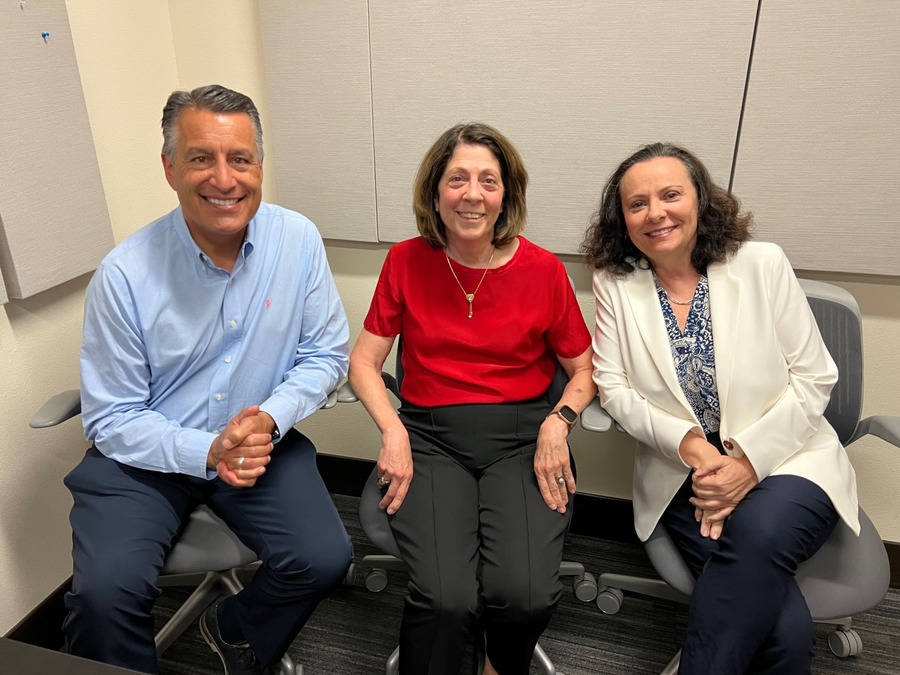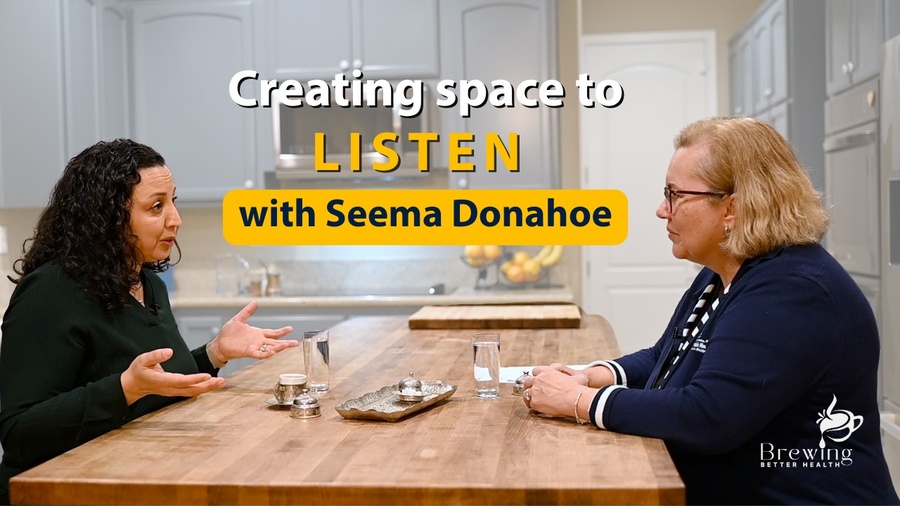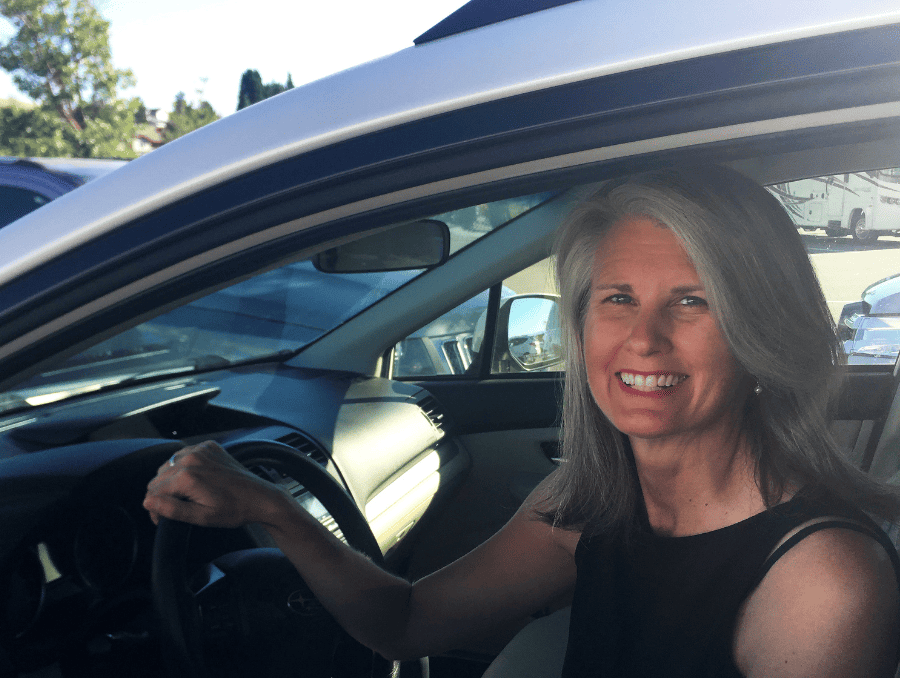
In Sagebrushers season 2 episode 14, University of Nevada, Reno President Brian Sandoval visits with the School of Social Work Interim Dean Lillian Wichinsky and Associate Dean Eugenia Weiss. In addition to her leadership role, Dr. Wichinsky is an associate professor and a community practice social worker. Dr. Weiss is also an associate professor, whose research interests include promoting well-being for vulnerable populations such as Latinx, women and military and veteran populations.
During the episode, Sandoval, Wichinsky and Weiss discuss Wichinsky and Weiss’s education and research backgrounds as well as what led them to the University. Wichinksy and Weiss also define social work for listeners and describe the many job opportunities that the field includes. They also talk about the importance of moving into their new building on campus during the summer of 2023 as well as the school’s plans for the future as it continues to expand.
Sagebrushers is available on Spotify, Apple Podcasts and other major podcast platforms, with new episodes every month.
Sagebrushers – S2 Ep. 14 – School of Social Work
Join host President Brian Sandoval as he, Interim Dean Lillian Wichinsky and Associate Dean Eugenia Weiss explore the importance of social work, the school’s new building and more.
Dr. Lillian Wichinsky: Social work is a remarkably diverse profession. Anything from serving in the legislature to working in schools, working in the hospitals, working in mental health centers, working in environmental-type areas, working youth programs, and there's a book about 101 careers for social workers. And with that same MSW degree or that same BSW degree, you can go in a number of directions.
President Brian Sandoval: In this episode of Sagebrusher's, we welcome two leaders from the University of Nevada, Reno School of Social Work, Dr. Lillian Wichinsky, interim dean of the School, and Dr. Eugenia Weiss, associate dean of the School. I'm Brian Sandoval. I'm a proud graduate and president of the University, and I'm your host for Sagebrushers.
In addition to serving as an interim dean, Dr. Wichinsky is an associate professor and a community practice social worker. She has dedicated 20 years of her career to higher education, and her research interests include community practice, organizational culture, and climate and experiential learning. Dr. Wichinsky has a Ph.D. in social welfare from Florida International University in Miami, a master's degree in social work from California State University in Sacramento, and a Bachelor of Arts degree in Psychology from the University of Florida in Gainesville. Dr. Eugenia Weiss is the associate dean of the School Social Work, as well as an associate professor. Her research interests include promoting wellbeing for vulnerable populations such as Latinx, women and military and veteran populations. She also conducts program evaluations and leadership trainings for Latinx behavioral health providers in building health equity. Today's podcast is being recorded at the Reynolds School of Journalism on our University's campus. Dean Wichinsky and Dr. Weiss, welcome to Sagebrushers. I look forward to hearing about the exciting updates coming from the School of Social Work.
Dr. Lillian Wichinsky: Thank you, President Sandoval.
Dr. Eugenia Weiss: Thank you.
President Brian Sandoval: Yeah, you're very, very welcome. So, I'd like to start by learning a little bit more about each of your backgrounds and first, what brought you to the University Dean Wichinsky?
Dr. Lillian Wichinsky: Well, I originally was actually a social worker in the state of Nevada a number of years ago, and then for a short while, came up to Nevada, to Reno and really liked the area, but moved away for a while. And when the opportunity came to apply and to become the associate dean, it just excited me. University of Nevada has a great reputation for social work. The students have exceptionally high pass rates on exams. The curriculum is generalist so we can prepare good social workers, and I felt this would be an innovative place to work. And then, of course, a year later I became the dean.
President Brian Sandoval: So, you became Dean after only one year?
Dr. Lillian Wichinsky: Yes, I was a little surprised, but I've been in leadership for a really long time. And so, I looked at it as a great opportunity to continue with that innovation, to bring new types of learning. Experiential learning is really important. And so, it seemed really fast, but I seem to be settling into the role pretty well.
President Brian Sandoval: Well, we're so happy you're here and you're doing a wonderful job.
Dr. Lillian Wichinsky: Thank you.
President Brian Sandoval: And so, we'll move to you, Dr. Weiss, and congratulations on your recent appointment to associate dean. In your bio, we mentioned a brief description of your research interest. Could you elaborate on this and the work you've been doing since you joined us on campus?
Dr. Eugenia Weiss: Oh, thank you so much. Such an honor and privilege to be here with you and Dean Wichinsky. So, I started out as a clinician, a licensed clinical social worker. Did that for almost 20 years, and then I shifted to higher education. I began teaching, and then I discovered that I loved teaching and being with students and being part of, you know, creating the next generation of future social workers. My research interests are primarily in military and veteran families and serving the Latinx community, particularly with regards to developing leaders, emerging leaders in health equity. I'm Latina, myself and so, for me, this has been a great sort of opportunity and passion as we're an emerging Hispanic serving institution to be able to prepare future social workers to serve our communities, particularly the Latinx community. And so now, as I move into my new role as associate dean, I'll be assisting our Dean in carrying out the functions and all of the innovative ideas that she's bringing to the table. And I'm very excited to be here. It's just been an amazing opportunity and we just continue to grow. It's very exciting times. Thank you.
President Brian Sandoval: No, thank you. And for both of you, it's just extraordinary what you do. So, for some of our listeners, and before we dive into, you know, what's happening within the School of Social Work, some people may not know what a social worker does. So, will you talk a little bit about that? Dean Wichinsky?
Dr. Lillian Wichinsky: I'm really excited to talk about this because when I first began working in the field of social work, I thought the only thing there was, like a lot of other people, is social workers remove children from their home. But we're just so much more than that. My own career path has kind of gone along that way, but social work is a remarkably diverse profession. Anything from serving in the legislature to working in schools, working in the hospitals, working in mental health centers, working in environmental-type areas, working youth programs, and there's a book about 101 careers for social workers. And with that same MSW degree or that same BSW degree, you can go in a number of directions. And so, I want people to know that, and I also want them to know that there's such a growing demand for social workers. We provide the majority of mental health care in the United States and in Nevada. And so, there's just this, this constant growing demand in different areas for social workers to come. And so, it's important that people know it's not removing children from the home, it's social justice and advocacy in all those areas.
President Brian Sandoval: So, and again, I appreciate your service and we've talked about that book before, but maybe tell the audience what do you think are one of the most unique pathways for a social worker that you've seen somebody go?
Dr. Lillian Wichinsky: So, I'll tell you about, we're going to talk a little bit about some of our faculty, but we have one senator, former senator who was a social worker. There's a unique pathway working with environmental issues because there is something called environmental racism where people living in poverty are going to have higher climate impact. And so, those are unique. But I also think also the mental health needs are important and it's not as unique. But then there's working with children, working with the aged, working, you know, with families, working with youth, working in foster care, and it's so broad and there's just so many ways to go. And then of course there's research and higher ed. One of our new faculty that we're going to talk about, she was working in Pakistan, working with immigration and with helping build canals, you know, and those kinds of things. So, the field is so open and you're not limited by the education that you get.
President Brian Sandoval: Dr. Weiss?
Dr. Eugenia Weiss: Yes, I love to add to this because I'm really passionate about social work. My daughter says I'm a die-hard social worker. I love that. So, I'm also a psychologist and I have to tell you, social work is the way to go, and it's given me so much versatility and diversity in what I've done. And also seeing just my colleagues. So, you can start in one area of social work and then move on to the next. So, it's endless possibilities. I call it everything, I think that you can do pretty much anything in social work. And that's just something that I think is just so valuable. I don't know any other degree that allows that amount of flexibility. And we do have a social justice sort of perspective, which is unique to the other human serving careers that we're focused on that.
President Brian Sandoval: Wow. Boy, time is really flying here. This is fascinating. So, you welcome a number of new faculty at the school. Tell us a little bit about your new researchers and their research interests.
Dr. Lillian Wichinsky: Oh, this is so exciting. We have been very fortunate to have attracted new faculty. So, for instance, Dr. Allen Ratliff, who came to us from another university, studies violence and marginalization, gender identity, homelessness, and does something unique with GIS mapping on resources for when you talk about the use of technology and moving forward in social work using technology to address that. Then there's Dr. Dominique Montgomery who works doing research around foster care and child welfare, Black studies. Dr. Lex Owen, who studies disability services and youth special healthcare needs. It's pretty exciting.
Dr. Eugenia Weiss: Yes. And so, you could see some of that versatility and diversity, even within our own faculty members. We also have Dr. Weiyu Mao who focuses on aging and caregivers and dementia. And Dr. Chang Seo, his focus is on welfare and poverty, inequality and the working poor. And then we also have Dr. Ashley Daftary with us. She focuses on structural inequities and anti-oppressive practices across systems including immigration and schools, education and policy making. And we have very exciting, our newest faculty member who will be joining us this fall, Dr. Melody Huslage, and she focuses on diversity, equity, and inclusion, and Latinx and immigrant and refugee communities. This is the person that the dean was referring to earlier with resettlement and refugees.
President Brian Sandoval: Oh, this is incredible. And it's exciting times for the school of social work. Not only these all-star editions to the faculty, but you're also getting a new building. So, you want to talk a little bit about the new social work, the building that you have and how that'll affect your programs?
Dr. Lillian Wichinsky: Well, this is just so, so exciting. We're moving into our, I like to say our new home because it has the feel of a home for the School of Social Work. It's a historic building. It was constructed in 1921, and that's pretty exciting. It's in the historic district in the National Register of Historic places on our campus. So, the work's been going on for a couple years, since 2019, and now it's almost ready. Well, it's actually ready. We're just waiting for our furniture. So, I'm excited because when people walk down this campus, when the students walk in front of it, they're going to see the school of Social Work, and that's pretty exciting. We have a presence on this campus for the good work we're doing for the number of students. Our students are going to feel like they have a home, we have a lounge for them, and we have a place that they can be part of. And we want our alumni to feel the same way. We want to make them a part of it. We have 3,000 alumni, we looked it up since 1968, and we want them to know this is their home too, and that they can be a part of that.
President Brian Sandoval: It'll be the first time in the history of the University that you have a dedicated building to the School of Social Work, correct?
Dr. Lillian Wichinsky: Yes. The first time it, the school was established in 2019, so we're still very new, not in the work we're doing, but new as far as being a school.
President Brian Sandoval: So, let's talk about one more subject, and we're almost out of time, but what are your hopes and aspirations for the future?
Dr. Lillian Wichinsky: We want more scholarships. We're working to create more scholarships so that more students come through the program, fulfill the needs of the state, and walk out with very little or no debt if that's possible. We want to build programs around to, with technology to train our students for those opportunities. We want to start more community-based projects. We want to use that technology to strengthen the training, but also to build upon working in collaboration with other schools. And finally, we want to strengthen our relationship with our alumni. We're on that path right now because we need those alumni as well, creating new partnerships and creating new practicums for our students. So, there's just so much we want to do.
President Brian Sandoval: And Dr. Weiss, you're in this new position. What are your hopes and goals?
Dr. Eugenia Weiss: Oh, we have so many. Very exciting times as we've been talking about. One of the things that we've been thinking about is really further developing our workforce so that we can meet the needs of Nevadans. We don't rank, unfortunately, I won't give you the number, but we don't rank very high in terms of our needs being met in terms of health equity. So, we really want to bolster our community and our ability to serve the community, and we want to continue to develop scholars. So, one of our goals somewhere down the line is to develop a doctoral program so that we can better prepare social workers and research so that we can meet the needs of our communities.
President Brian Sandoval: And if you were talking to a prospective student and recruiting them to your school of social work, what would you tell them? What kind of career could they look forward to?
Dr. Lillian Wichinsky: The program is great. The faculty are amazing. There's opportunity for a very general education and then their ability to focus in an area that they want to focus in. So, I would tell them this is a great program, that it's an opportunity to grow as a person, but also to provide, make a difference. I always talk about, you know, this is a field that can make a difference in the lives of others, and this program allows for that. UNR is a great place and we have great curriculum, very innovative, and we're continually working to do that.
President Brian Sandoval: Well, that's fantastic. And unfortunately, that is all the time we have for this episode of Sagebrushers. And thank you both for joining us today, Dean Wichinsky and Dr. Weiss. This has really been fabulous. So, join us next time for another episode of Sagebrushers as we continue to tell the stories that make our University special and unique. Until then, I'm University President Brian Sandoval. Go Pack.
















